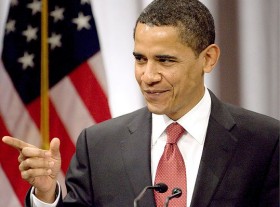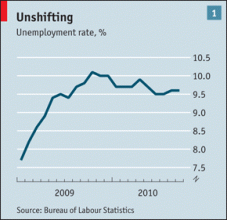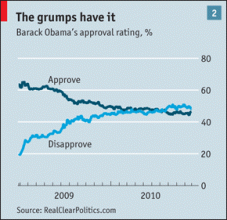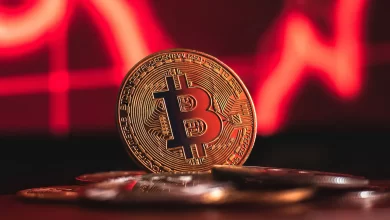
 He may not feel it on the eve of what is likely to be a wretched mid-term election for his party, but Barack Obama is a lucky man.
He may not feel it on the eve of what is likely to be a wretched mid-term election for his party, but Barack Obama is a lucky man.
The new boy from Illinois who joined the Senate in 2005 cannot have expected to become president in less than four years. Though not lacking in self-belief, he thought his chance would come later. But within a year, Pete Rouse, his chief of staff, urged him quietly to lay plans for a presidential run in 2008, just in case “a perfect storm” gave him an opening.
One part of the perfect storm that blew Mr Obama into the White House was the financial panic that followed the collapse of Lehman Brothers in September 2008 and cruelly exposed John McCain’s imperfect grasp of economics. The younger candidate was not only the better communicator, but seemed also to possess the cooler head and safer hands for troubled times. At his swearing-in in 2009, the Democrats enjoyed comfortable majorities in the House and the Senate and Mr Obama himself basked in a worldwide sunshower of goodwill. Pundits started to wonder whether the defeated Republicans had been smashed for a generation.
How is it possible, just 21 months later, that the Democrats are expecting a thrashing next week and the Republicans look poised to take control of the House of Representatives, and maybe even the Senate? The main answer is that the same economic storm that propelled Mr Obama into office has played havoc with his presidency. But there is more to it than that. To see why, it helps to break the story into three parts: the legacy he collected from George Bush, the distraction of health reform and the resulting fracture between the American people and the man in whom they had invested so much hope.
The poisoned legacy
Everyone knew that Mr Obama had inherited the in-box from hell. The banks had to be saved from collapse and the real economy resuscitated. There were unfinished wars in Iraq and Afghanistan and fear that the earth was overcooking in its shroud of greenhouse gases. Since his election Mr Obama has had to deal not only with these matters but also with others he could not have foreseen, such as a BP oil rig exploding and squirting 170m or so gallons of crude oil into the Gulf of Mexico. Nonetheless, by the end of 2009 Mr Obama thought he had done rather well, using Oprah Winfrey’s show to award himself “a good, solid B-plus”. This was not, or so it seemed at the time, an implausible mark. His administration had, after all, tackled some huge economic problems early on, and with apparent success.
First of these was the need to stabilise the financial system. In its final weeks the Bush administration talked a deeply reluctant Congress into enacting the Troubled Asset Relief Programme (TARP) so that $700 billion of taxpayers’ money could be used to keep the system afloat. But Mr Obama’s team had to finish the job. In doing so they resisted calls to take the banks into public ownership and opted instead for a regime of “stress tests”, a controversial approach that had to be adapted over time but appeared ultimately to work: American banks are now better capitalised than they have been for decades.
The real economy also needed instant attention. The banks had stopped lending and consumer confidence had evaporated. Two weeks before the election, the Fed forecast that the rate of unemployment, which was then 6.6%, would continue to rise in the course of 2009 and that 2010 would see only a moderate recovery. During the transition, Mr Obama therefore began to prepare a standard Keynesian response: a stimulus bill to jack up public spending and cut taxes. The Recovery Act he signed into law in February 2009 allocated $787 billion, almost all to be spent in two years: roughly one-third in tax cuts, one-third in new spending and the final third in transfers to the states.
Also during the transition, Mr Obama had to work out what to do about GM and Chrysler. The titans of Detroit were tottering on the brink of liquidation, threatening to collapse and take more than a million jobs with them. Mr Bush threw them a temporary lifeline, but it fell to Mr Obama to decide that the government should bail them out. He gave GM $50 billion in return for 61% of its shares, but on tough conditions. The firm had to declare bankruptcy and fire its managers. As with the banks, this appears in hindsight to have been a sound enough call: both firms are back in profit and the federal government intends to dispose of its stake.
If it was not outlandish of Mr Obama to award himself that solid B-plus at the end of 2009, what has changed? What matters is what has not changed. The banks are safer and the car industry healthier, but the ghost of Keynes has failed to work his magic. Formally the recession ended a year ago, and the danger of a second dip is receding. But the post-stimulus recovery has faltered and unemployment, at just under 10%, is stubbornly refusing to fall (see chart 1). Last February, a year after signing the Recovery Act, Mr Obama had to concede that with millions of Americans out of work and millions more unable to make ends meet, “It doesn’t feel like much of a recovery yet.”
 Republicans claim this as proof that the stimulus failed. That is, to put it charitably, an over-simplification. The non-partisan Congressional Budget Office says that far more people would have been out of work in an unstimulated America. Indeed, to those on Mr Obama’s left the disappointing results show that the president was too cautious and the package too small. But that is not how it seemed at the time to the politicians making free with taxpayers’ money. A cool $800 billion or so, on top of the $700 billion for the TARP, looked more profligate than parsimonious. Whether the White House could have got more from an already shell-shocked Congress remains an open question.
Republicans claim this as proof that the stimulus failed. That is, to put it charitably, an over-simplification. The non-partisan Congressional Budget Office says that far more people would have been out of work in an unstimulated America. Indeed, to those on Mr Obama’s left the disappointing results show that the president was too cautious and the package too small. But that is not how it seemed at the time to the politicians making free with taxpayers’ money. A cool $800 billion or so, on top of the $700 billion for the TARP, looked more profligate than parsimonious. Whether the White House could have got more from an already shell-shocked Congress remains an open question.
The distraction
Seven months ago, in what may have been the proudest moment of his presidency, a beaming Mr Obama signed into law a far-reaching bill to reform America’s system of health care. He was doing so, he said, “for all the leaders who took up this cause through the generations”: Teddy Roosevelt, Franklin Roosevelt, Harry Truman, Lyndon Johnson, Bill and Hillary Clinton and the late Ted Kennedy. Its passage was “remarkable and improbable” because the punditry, lobbying and game-playing of Washington had made it easy to doubt America’s ability to do “such a big thing, such a complicated thing”.
He was right. The Patient Protection and Affordable Care Act was, as Joe Biden, the vice-president, was overheard telling the president at the signing ceremony, “a big fucking deal”. But was it wise of Mr Obama to put such a big thing, such a complicated thing, at the very heart of his presidency in his very first year, in the middle of America’s worst recession for decades?
The lack of universal health care has long made America an oddity among rich countries. Obamacare will start to change that. It compels every citizen to buy health insurance on pain of a fine. In return, the poorest buyers get a subsidy. And in return for receiving more than 30m previously uninsured customers, many of them young and healthy, the insurance companies are obliged to offer more generous coverage. For example, they will no longer be able to deny customers coverage on the strength of some pre-existing condition, or put a cap on how much health care they will pay for over a lifetime.
When America created Social Security (pensions) in 1935 and Medicare (health care for the elderly) in 1965, these big measures enjoyed at least some bipartisan support. But although Obamacare is modelled on a scheme introduced first in Massachusetts by a Republican governor, Mitt Romney, the bill ran into ever-fiercer Republican opposition as it struggled through Congress. Some anxious Democrats predicted that no Republicans would come on board, and urged haste. But the hope that they might—and Mr Obama’s decision to leave the initiative with Congress instead of grabbing it himself—held everything up. The bill the president had hoped to sign by the summer of 2009 did not reach his desk till the spring of 2010, having failed in the end to attract the vote of a single Republican in the House or Senate.
This was supposed to be the Obama administration’s proudest accomplishment, and yet you will hear precious few Democrats boasting about the bill on the campaign trail. Most ignore it, and many make a virtue of having voted against it.
That is because the bill is not much loved. As with the Recovery Act, the left thought it changed too little and the right that it reached too far. Every compromise that helped persuade some politician drained another’s enthusiasm. It does little to tackle soaring health-care costs. Mr Obama disappointed liberals by ruling out a single-payer system and dropping the public option (a plan for a government-run scheme to compete with the insurance companies). Republicans say the government “takeover” is not only unaffordable but unconstitutional as well. By what stretch of the imagination (or the commerce clause), they ask, does the constitution give the feds the power to force citizens to buy insurance they do not want?
And yet if the Democrats are routed next week, it will not be because of the merits or defects of the bill itself. The real problem is that, in spite of the sound and fury, health care is not the main thing on voters’ minds. When the Kaiser Family Foundation asked which issue would most influence their mid-term vote, 35% of voters chose the economy and jobs and only 10% chose health care. That is hardly surprising at a time of acute economic distress. But it does raise the question of whether Mr Obama’s decision to spend so much of his political capital on health care was a monumental strategic blunder.
The Democrats’ fixation with health reform and the failure of the economy to perk up after all the stimulus spending handed a neat Just So story to Mr Obama’s foes. This is a president, they say, who fiddled with a health-care system that was not broken while the economic house burned down. This story does scant justice to the efforts Mr Obama made on the economy, but you can see why it has stuck. The president’s big economic decisions—on the banks, the stimulus and Detroit—were bundled together in the transition period before he took office or immediately afterwards. As they receded from view, health took centre stage and continued to hog the limelight for almost a year.
This saga, moreover, made ugly viewing. Like many a president, Mr Obama took office vowing to transcend Washington’s tribal politics and neuter the power of special interests. But once it became clear that the Republicans intended to make health reform his “Waterloo”, he determined that the effort was too big to fail. Pushing it through entailed resorting to all the sharp practices he had vowed solemnly to expunge: appeasing special interests, such as the hospitals and the pharmaceuticals industry, and feeding pork to wavering allies. It got worse after Senator Kennedy died and Massachusetts sent a Republican to take his place. Having lost their supermajority in the Senate, the Democrats resorted to a questionable budget procedure to defeat a filibuster. Mr Obama got his bill, but the process left a sour taste in the mouth and the Republicans claimed it had been “rammed through” against the people’s wishes.
The disconnect
In September of this year Gallup published a poll in which it listed five of the administration’s main achievements and asked respondents whether they approved of them. A majority (61% to 37%) approved of one: the reform of financial regulation passed this summer. Every one of the other four got a thumbs-down: the rescue of the financial system (61% to 37%), the stimulus package (52% to 43%), the bail-out of the car companies (56% to 43%) and health reform (56% to 39%).
 Later the same month the president admitted that he had failed to sell his policies well enough. “Given how much stuff was coming at us, we probably spent much more time trying to get the policy right than trying to get the politics right,” he told the New York Times. “There is probably a perverse pride in my administration—and I take responsibility for this; this was blowing from the top—that we were going to do the right thing, even if short-term it was unpopular.” Good policy, bad public relations: the excuse of unpopular governments everywhere. But bad public relations hardly captures the scale of Mr Obama’s failure to retain as president the connection he forged with the American people as a candidate.
Later the same month the president admitted that he had failed to sell his policies well enough. “Given how much stuff was coming at us, we probably spent much more time trying to get the policy right than trying to get the politics right,” he told the New York Times. “There is probably a perverse pride in my administration—and I take responsibility for this; this was blowing from the top—that we were going to do the right thing, even if short-term it was unpopular.” Good policy, bad public relations: the excuse of unpopular governments everywhere. But bad public relations hardly captures the scale of Mr Obama’s failure to retain as president the connection he forged with the American people as a candidate.
A CBS poll in October found that the proportion of Americans who approved of Mr Obama’s handling of the economy had fallen to 38%, from 46% at the beginning of this year. It is hard for any president to keep voters sweet when the economy is tanking. Not even the sunny disposition of Ronald Reagan could stop his approval ratings plunging as he faced the mid-terms of 1982. But Reagan did at least manage to keep control of the message and head off the expected disaster at the polls.
Mr Obama, by contrast, is struggling. On the campaign in recent weeks he has tried to revive the electricity he generated in his presidential campaign, but the man who inspired voters in 2008 now strikes many as professorial and aloof. His stump speech offers a simple two-part explanation of what has gone wrong. Mr Bush left behind the worst economic mess since the Great Depression, and an irresponsible Republican Party has not just refused to help the new man clean up the mess but has done everything possible to obstruct his efforts. Here he was last week, at a rally in Portland, Oregon:
Look, now, here’s what they calculated—and it was a clever political calculation. They said to themselves, boy, we made such a big mess, we are in such a deep hole that it’s going to take everything Obama’s got just to try to get us out of it. It’s going to take some time to repair the economy. Folks are going to be frustrated and angry. And if we just sit on the sidelines and oppose Obama and Democrats every step of the way, if we say no even to the policies that traditionally we’ve supported to help small businesses or to cut taxes, then maybe we can ride people’s anger and frustration—they’ll forget that we were the ones who caused this thing in the first place.
Needless to say, the Republicans challenge this version of events. True, every Republican in the House voted against stimulus, but they say that was because although they wanted oh so much to help, a principled opposition could not rubber-stamp the “pork-laden” bill drafted by the Democrats. Far from revealing them as the party of no, says Eric Cantor, the Republican whip in the House, the Republicans’ unanimous rejection showed that they were the “adults in the room at a reckless liberal blowout on the taxpayers’ dime.”
Maybe. But even if Mr Obama is right that the Republicans are just the undeserving beneficiaries of the general discontent, they saw sooner than he did the welling public rage at the spectacle of bankers and borrowers receiving bail-outs while the virtuous paid the bills. The birth moment of the tea parties came in February 2009 with the televised rant of Rick Santelli, a former Chicago trader, at news of a plan to help homeowners with delinquent mortgages. “This is America!” he yelled. “How many of you people want to pay for your neighbour’s mortgage that has an extra bathroom and can’t pay their bills?”
In point of fact, many Republicans in Congress voted for the TARP, the mother of all the bail-outs. But many now say they repent, and the righteous anger of the tea-partiers has breathed new fire into the party’s belly. Because they see in Mr Obama a big-spending socialist, intent on tearing up the constitution and destroying the free-enterprise system, tea-partiers are determined to turn out and vote against the Democrats on November 2nd.
In contrast, many of the progressive voters who were his most enthusiastic supporters in 2008 are disappointed by Mr Obama’s caution in office. They expected so much more: not just a bolder version of health reform but also immigration reform, action on global warming, a faster exit from Afghanistan, the advancement of gay rights and the closure of Guantánamo.
None of this has happened. Anticipating opposition from his own party as well as the Republicans, Mr Obama never made a serious push on immigration, to the dismay of Hispanic voters. As to global warming, the Copenhagen summit was a flop and the cap-and-trade energy bill, having passed in the House, got stuck in the Senate, not least because of the president’s decision to make health legislation his priority. He promised in last January’s state-of-the-union speech to repeal the policy of “Don’t ask, don’t tell”, which prevents gays from serving openly in the armed forces, but this has not yet been done. Indeed, for technical reasons the administration is at present appealing last month’s ruling by a federal judge that the policy is unconstitutional.
The upshot is that a lot of Mr Obama’s liberal supporters, unlike the fired-up Republicans, say they intend to stay at home on November 2nd, reserving final judgment on this enigmatic president until he faces re-election in 2012. Mr Obama may by then have got his mojo—or, better still, a growing economy—back. But that won’t help the Democrats next week.
The Economist
Error, group does not exist! Check your syntax! (ID: 10)

